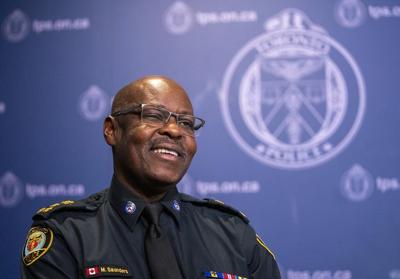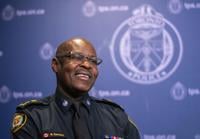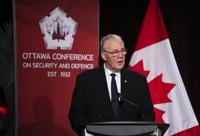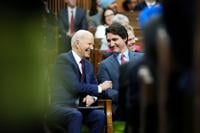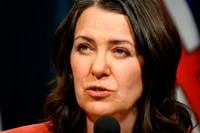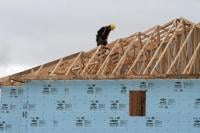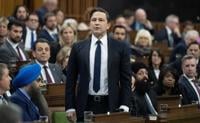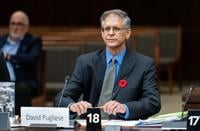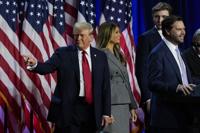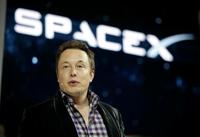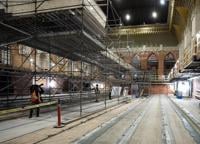Toronto's mayoral race intensified Tuesday as two prominent civic leaders announced their bids to fill the seat left vacant by John Tory.
City councillor Josh Matlow made his long-anticipated entry into the race Tuesday morning, hours after former police chief Mark Saunders announced he would be running for the top job.
Matlow and Saunders join Ana Bailão, a former deputy mayor and Tory's housing point person, in an already crowded field of contenders, with the formal nomination period still yet to open.
City councillor Brad Bradford hasn't officially announced a bid but is also expected to run after forming a campaign advisory committee last month, while Liberal MPP Mitzie Hunter has said she is considering a bid as well.
Toronto politics observer Myer Siemiatycki said Tory's departure last month, which came after the former mayor admitted to an affair with a staffer, has created the circumstances for a heated election.
"A lot of people see a path for themselves ahead as the victor in a contested, congested, maybe even gridlocked mayoral race," Siemiatycki, professor emeritus of politics at Toronto Metropolitan University, said in an interview.
The list of mayoral hopefuls also includes former city councillor Giorgio Mammoliti, former Toronto Sun columnist Anthony Furey and Gil Peñalosa, who emerged as Tory's main left-wing challenger in the last election.
The crowded field could flip conventional campaign tactics on their head, Siemiatycki said. Rather than try to build a wide base of support, the campaign might see candidates attempt to carve out a small, but well-defined slice of electoral backing, he said.
"In my close to five decades of following Toronto, municipal elections, I've never seen an impending mayoralty race like this one," Siemiatycki said.
Saunders said restoring a sense of "community safety" would be his top priority. His campaign announcement cast Toronto as a city gripped by a sense of fear and uneasiness, while pointing to transit safety concerns.
"When we talk about the crime that's happening in the city, the types of crime, specifically the random types of crime and disorder that are happening across the city, we need to put a reset on that and bring the city back to where it needs to be," he said in an interview.
Siematycki predicted a "rocky road" for Saunders, whose tenure as the city's first Black police chief ended with a resignation in June 2020.
Crime rates went up during his term, he faced significant pushback from the LGBTQ community for his handling of the case of serial killer Bruce McArthur and he mounted an unsuccessful bid as a Progressive Conservative candidate in the 2022 provincial election – all facts his opponents could wield against him, Siematycki said.
Saunders said leadership includes demonstrating a willingness to listen to criticism, noting he launched an independent review of the police force's handling of missing persons files after the McArthur case.
"My track record shows that I am willing to talk and I am willing to come up with the right solutions through collaboration and I'm looking forward to that opportunity," he said.
Saunders also spent a year as Premier Doug Ford's special adviser on the redevelopment of Ontario Place, an iconic Toronto waterfront park. Asked whether he supported the project, which includes a contentious proposal for a private spa, Saunders said he had not paid close attention to it since he left the role in March 2022.
Matlow's campaign announcement, meanwhile, characterized Toronto as a vibrant city that has deteriorated because city services have been starved through a decade of "artificially" low taxes.
He said his first act as mayor would be to launch a new dedicated property tax – at a cost of $67 per year to the average homeowner – to raise around $390 million over five years to support transit, libraries, shelters and other services.
While he said it was "unconventional" to launch a campaign with a pledge to increase taxes, Matlow said he believed "Torontonians recognize that the status quo is not working for them."
"If we're serious about our fiscal challenges and addressing the declining services in our city that's been going on for far too long, then we need to have an honest conversation about how to pay for it," he said in an interview, noting his proposed tax increase amounted to about $5.50 a month.
Matlow, a councillor since 2010 who has been an outspoken critic of Tory and Ford, said he thinks Torontonians are willing to invest "the price of a sandwich" to "improve their lives and the lives of their neighbours."
The mayoral race also marks Bailão's return to municipal politics, after the three-term councillor declined to run in the fall election. While she served as deputy mayor under Tory, Bailão said she has her own vision for the city.
"People have to look at me for who I am," she said in an interview.
Bailão said she would reverse cuts to the Toronto Transit Commission and speed up the approval process for affordable and supportive housing, as part of a larger bid to improve city services and affordability.
"We really need somebody who is going to push for a fair deal for Toronto," she said.
The nomination period for the mayor's race is expected to open on April 3, with a byelection expected on June 26.
This report by ºÚÁϳԹÏÍø was first published March 21, 2023.

